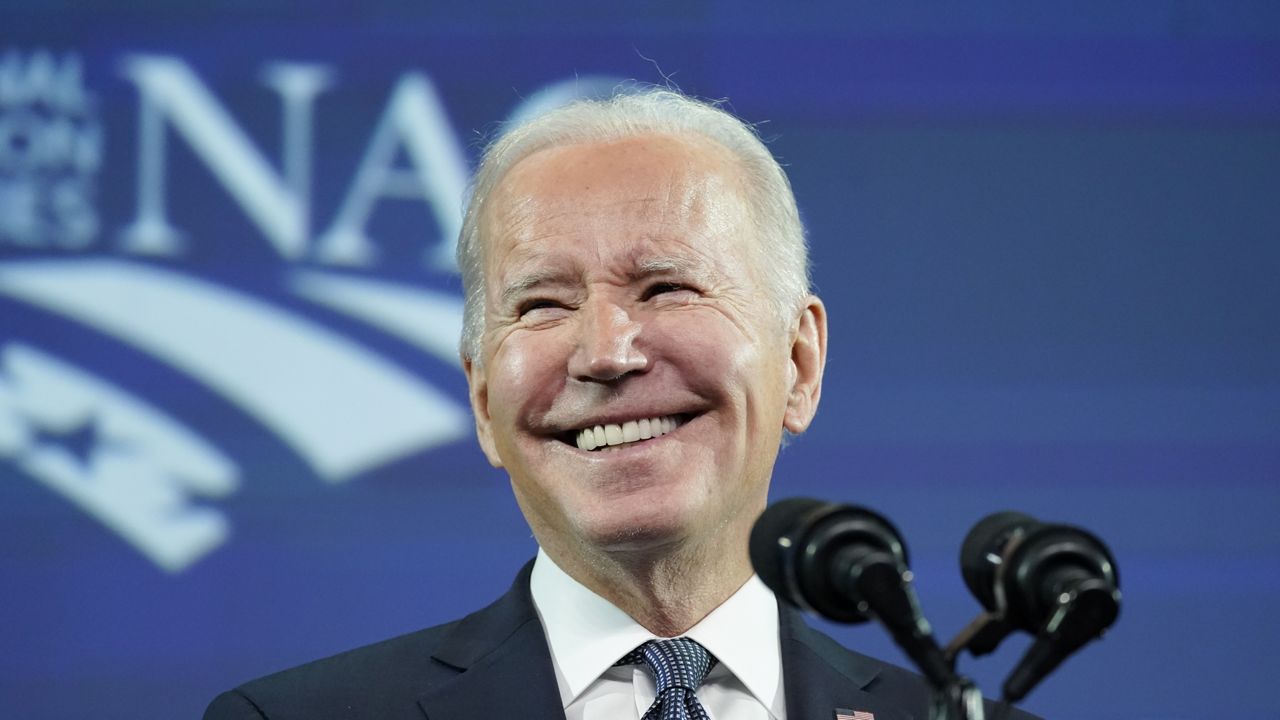President Joe Biden on Tuesday addressed county officials across the country to stress the need for partnership between local leaders and the federal government in order to best serve their constituents.
“My name is Joe Biden. And I used to be a county councilman,” Biden said during a meeting with the National Association of Counties Legislative Conference, a group that represents nearly 2,000 elected or appointed county officials. “I ran for the Senate because it was too damn hard being on the council.”
The president leaned on his time as a local and state leader as he praised those present at the assembly, saying he understands firsthand the difficulties of the job. Biden started his career in politics in his late 20s, and was elected to serve on the New Castle County Council in Delaware in 1970. Biden would later go on to serve as senator for Delaware in 1972.
“You want to know how seriously I take the role you play on the frontlines in this country? Just look at who I asked to come with you,” Biden said. “You said you want to know what's going on. I sent you the whole damn administration.”
Over the course of the five-day conference, which will wrap up on Wednesday, nearly a dozen members of the Biden-Harris administration spoke to attendees. Each of them, like Biden, highlighted local projects around the country that were or will be funded, at least in part, from money included in last year’s American Rescue Plan and Bipartisan Infrastructure law.
Biden pointed to Howard County in Maryland as a prime example, commending city officials for a plan announced in mid-January that will give all full time Howard County Public School workers an $1,800 bonus as a token of appreciation “their hard work and dedication to our children” amid the COVID-19 pandemic, officials said at the time.
The county allocated $16 million towards the program. Half of the funds will come from American Rescue Plan funds and the other half will come from the county board of education.
“Put these funds to work to keep people on the job. Connect people with better jobs and provide retention bonuses for teachers and bus drivers, like Howard County, Maryland did,” Biden said, adding: “I urge all of you to use the flexibility built into that law. And spend those funds wisely to build a future around working people who make up the communities you run.”
The president touched on funding for increased broadband services during his address, commending Kentucky for “expanding high speed internet to nearly 100,000 homes and businesses.” The state received a $1 million federal grant thanks to funds from the American Rescue Plan to expand broadband access across the commonwealth.
The Bipartisan Infrastructure Law passed last year also included funds for broadband access. Under the bill, the Affordable Connectivity Program was allocated $14.2 billion to help low-income households afford high-speed internet. Households can apply for a $30 per month discount toward internet services; households on Tribal lands can receive up to $75 per month.
Those eligible can also receive a $100 discount towards the purchase of a laptop, desktop computer or tablet, so long as the family can contribute between $10 and $50 towards the overall price.
Some experts estimate that 42 million Americans do not have access to high-speed internet at their homes, which was highlighted during the coronavirus pandemic, when everything from work to school to doctors appointments shifted online.
“You know how many times you drive by a McDonald's parking lot in the middle of the pandemic and see people out there sitting with mom and dad, tying into the network so their kids could do their homework remotely,” Biden said Tuesday. “This is the United States of America, for God's sake.”
Biden also called for action on his Build Back Better plan, a nearly $2 trillion social spending and climate package that passed the House in November, but faces an uncertain – if near impossible – uphill battle in the evenly-divided Senate.
The bill would, in part, help to lower prescription drug costs for American families, a topic the president has touched on in recent weeks, often telling of his son, Beau Biden, and his battle with brain cancer. Beau passed away in 2015 from glioblastoma.
“[If] you want to benefit a family, reduce the cost of the prescription drugs they have to pay,” Biden said to cheers on Tuesday. “In America, we pay the highest price for precision drugs in the world – of any developed nation in the world.”
Biden’s proposed bill would make a number of changes to the prescription drug market in the U.S., in part by imposing a $35 monthly cap on the cost of insulin.
Companies that increase prescription drug prices faster than the pace of inflation would face a steep excise tax under Biden’s proposal.
Biden’s bill would also allow Medicare to negotiate the price of prescription drugs directly with pharmaceutical companies with the hope of reducing costs for millions of Americans. Currently, Medicare can negotiate lower prices on nearly every medical item except for prescription drugs.
Another change to the Medicare system would impact seniors by capping the amount they have to pay on prescription drugs at $2,000 per year.
“There's no limit to what America can achieve. Let’s get working people a better chance than they've had, quality they deserve by investing in the future of every county,” Biden concluded his address. “Let's face these challenges head on. Let's keep building back better.”



